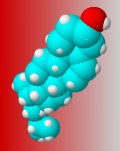 Worried
about you cholesterol? Been prescribed cholesterol-lowering statins? Now,
suffering hot flashes?
According to German researchers you may not be alone.
In a study that appeared in the December 1 issue of the Journal of
Clinical Investigation, Stefan Offermanns and colleagues at the
University of Heidelberg demonstrated why the cholesterol-lowering agent
nicotinic acid also commonly causes flushing or "hot flashes" that, although
harmless, often prompts patients to discontinue therapy. The authors found
that activation of the nicotinic acid receptor GPR109A by nicotinic acid can
produce different responses depending on the location of the receptor in the
body.
Worried
about you cholesterol? Been prescribed cholesterol-lowering statins? Now,
suffering hot flashes?
According to German researchers you may not be alone.
In a study that appeared in the December 1 issue of the Journal of
Clinical Investigation, Stefan Offermanns and colleagues at the
University of Heidelberg demonstrated why the cholesterol-lowering agent
nicotinic acid also commonly causes flushing or "hot flashes" that, although
harmless, often prompts patients to discontinue therapy. The authors found
that activation of the nicotinic acid receptor GPR109A by nicotinic acid can
produce different responses depending on the location of the receptor in the
body.The authors found that when nicotinic acid activates GPR109A is found on the surface of fat cells it induces a lowering of lipid levels. However nicotinic acid–induced activation of GPR109A expressed on immune cells in the skin prompts the conversion of arachidonic acid to prostaglandins that cause blood vessels near the skin surface to dilate, resulting in the characteristic flushing response. Independent researcher Nicholas Pike explains that this work "supports the hypothesis that immune cells in the skin are the most likely source of arachidonic acid and prostaglandins."